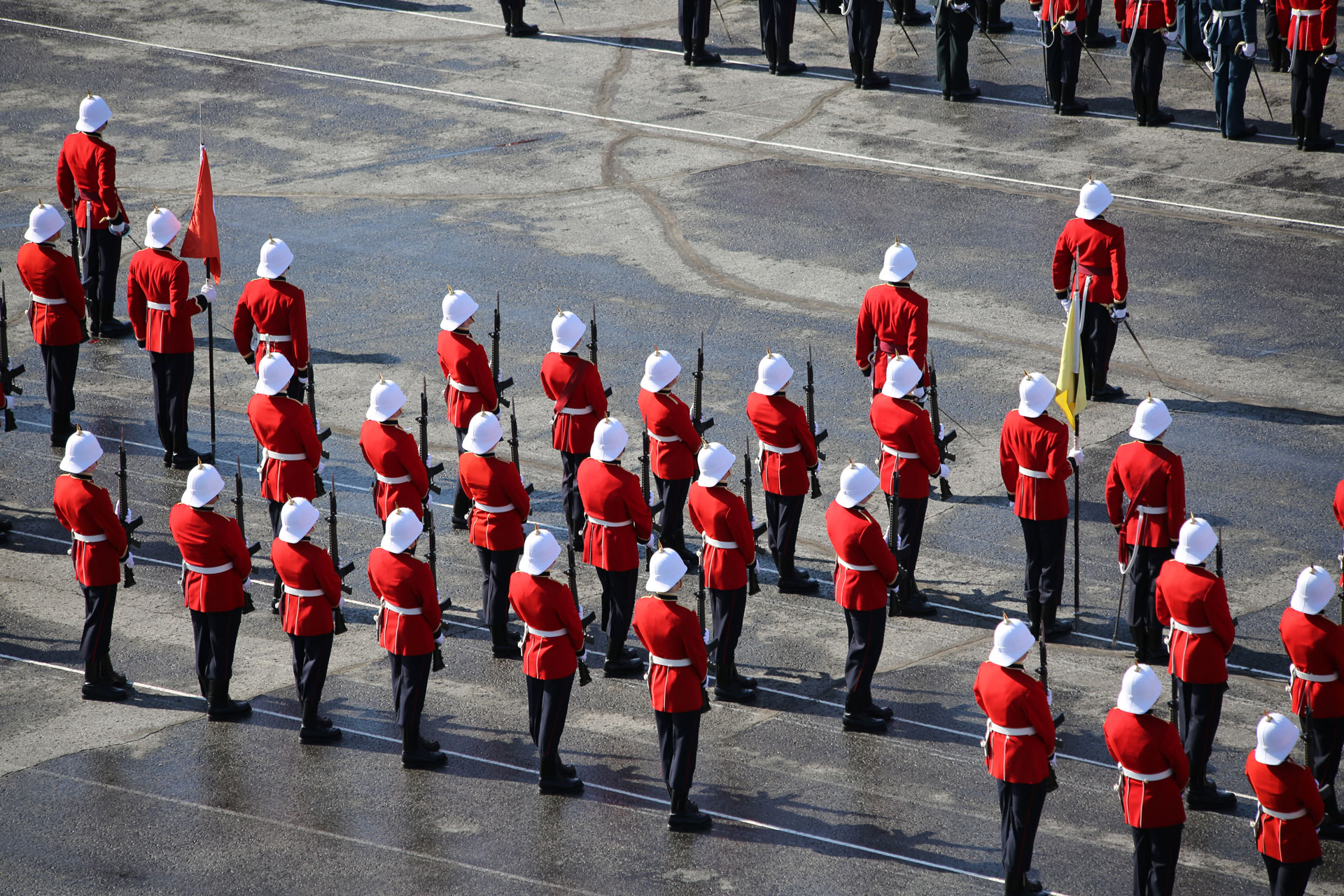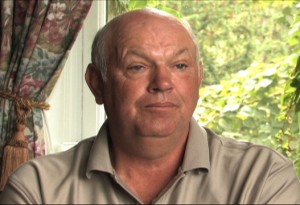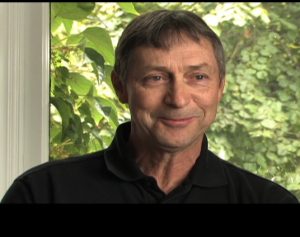
Colonel (Ret’d) Brian Akitt, 10194 (RRMC 1970-72, RMC 1972-74) (photo above) & Mr. Rick Wing, 10340 (RRMC 1970-72, RMC 1972-74)
This interview was conducted at Royal Roads Homecoming in September 2007 on the occasion of their 35th class reunion. Mr. Rick Wing left the forces in 1979 and is Dean of the School of Continuing Studies, Business and Hospitality at Sault College. Col (Ret’d) Akitt was in the air force for 30 years, serving as a national representative in Mons, Belgium and was also commanding officer of the Sea King Helicopters at Shearwater and Patricia Bay, BC. He is currently a director at General Dynamics Canada.
Contact Royal Roads University staff person Karen Inkster (Karen.Inkster@royalroads.ca ) for information on how to contribute to the Royal Roads Heritage Project.
Karen – Brian, how did you first know that you were interested in coming to the military college?
Brian – Well when I was going into grade 13 in Ontario I had the opportunity to travel with a friend to the recruiting center. He was the one who introduced me to the ROTP program. And after that I completed all the forms – without much hope of getting selected I thought at that stage. It progressed along the way, and eventually it was August of 1970 I got my telegram – if you can imagine back then – to say I had been accepted at Royal Roads Military College. Interesting enough, I didn’t even know Royal Roads existed. I thought I was going to Kingston, Ontario to the Royal Military College. It was only when I got my ticket that I realized I was actually headed to Victoria, BC.
Karen – And how did you feel?
Brian – Oh, I was excited about it. Having grown up on a farm, in small town Ontario, it was an opportunity to actually see Canada, and experience something totally different. I’d never been in cadets, and so moving into the military like that was totally new to me. And it was great.
Karen – Rick, what was the recruitment process like?
Rick – Well, I’m from a small town – the town has 500 people in it. And one of the people that was a senior of mine, I think probably six or seven years older than I was had gone to RMC and he was sort of held up as an example I guess. And when it came time to think about going to college or university – I had pretty good marks in school – but I didn’t have any opportunity. I didn’t think to actually go to university and get it paid for, or anything like that. I thought at the time that I was going to be able to get a hockey scholarship somewhere, but I wasn’t really good enough to get a scholarship either [laughs].
So I made the choice that I wanted to go to RMC and I applied and from our hometown you have to go about 500 miles to the recruiting center. So, I went to the recruiting center and went through the tests and that kind of thing and I wanted to go into Arts, not Science because I’d barely passed grade 13 math, so I made the application and I was accepted to Royal Roads immediately because it was the first time maybe I think that Arts students were actually accepted into Royal Roads, so I came to Royal Roads as part of that.
But, from a recruitment point of view, I didn’t have anybody in my family that was ex-military, so I didn’t have any military experience. I came because of the role model that I’d seen at high school and because I thought I could get to university and I wouldn’t have to pay. [laughs] So that’s why I came.
Karen – And what were your first impressions of the school?
Rick – Well, I was scared skinny. I remember getting on a bus in this little town, Bruce Mines. My parents put me in a bus, and they all sort of waved goodbye, and I went to a train station in North Bay and I got in the train station to come to Victoria and I hadn’t been out of Ontario, I don’t think. So, I was going to the farthest point west in the country without having been to the farthest point west in Ontario. So I was pretty anxious about coming out here.
Karen – Brian, what were your first impressions as you came to the college?
Brian – Well, this was my first experience with the military as well. And, as I drove in through the front gates of Royal Roads, and heard them clang behind us as we came through, I thought, I wasn’t quite sure I was ready for this. As we drove over the hill and looked down at the castle from on top and I thought “Oh, if this is the military, what must the other bases look like?” not realizing what Royal Roads was all about at that stage. And then after that, the impressions that stayed forever was all the shouting as we were told to Get out on the parade square, Stand up, Form up in three lines. And I quickly looked to see if the other group to see what they were doing and fell in beside one of the guys I’d met on the bus.
Karen – How about you, Rick?
Rick – My first impression was when we, I think we all get off in Vancouver and everybody was yelling our names and we had to get into a big line up and didn’t know anybody, and I remember it being sort of a confused sort of situation where everybody was sort of mingling around. The only resolve to the confusion was that we were all in a line and we were all quiet and somebody else was doing all the talking.
And, I remember coming here, as Brian said, we came into the parade square and we all lined and it was the first time that I got the feeling that I was in this with a bunch of other people that were in basically the same boat as me. So, I think there was some reassurance that we were all doing this together.
Karen – And what were the first two days like? What did you do?
Rick – Oh, man, I don’t remember, those first two days. I don’t remember the first month [laughs]. I remember thinking that I would miss home and I did miss home after awhile but we were too busy to really miss home. There was a lot of activity, and a lot of places where you had to go to the line up, and wait for this and wait for that, and everything was new. And, like I say, I think that the idea that we were in this together made a big difference for me.
The one thing I remember about the line ups is that my name starts with a W, so I remember that every time they got to me, the clothes were either too long or too short. I remember that. The other thing was that I had met some people in another small town that was not too far from North Bay where I got on the train, and by the time we had come here, we were going to the same place – never knew each other before that, we were going to the same place, andI’ve known them now for 37 years, so that was helpful [nods].
Karen – Brian, what was a typical day like for cadets?
Brian – Well, for a cadet you definitely rose before the alarms went up in the morning to get everybody else up, so you’d get a head start on it. And then it was just a blur afterwards. You quickly prepped, and I can remember everything had to be done in, literally within the 20 minutes so to speak, and running everywhere, and trying to make it all happen, and stay out of trouble.
One of the disadvantages I had, I discovered very quickly as well, was with a name starting with Akitt, you to make all the mistakes before anybody else did, and you were certainly reminded of that as well. But I also remember that with regards to the group you were set up with initially, and the friends you made in those first couple of days, they just stayed with you forever. And along the way, in fact, when we’d come back and we’d do the reunions —- they’re the group you’d go to first, and you really do have that sort of brother, that friendship, that family, together feeling when you get back together. But those first few days, they were truly a blur.
Karen – What changed from first year to second year?
Brian – Well, when you moved into second year, in fact, you were expected to be responsible. In first year you could make all the mistakes you wanted to, and you’d be corrected for them accordingly. But when you took that step into second year, then you had responsibility for the first years coming on. And it really did, it matured you along the way. It also gave you a greater respect for those who have gone before you as well, as you tried to introduce the new cadets into Royal Roads as well. And, those days became a blur as well, because you had the responsibility for the younger people.
Karen – Rick, what kind of courses did you take – academics as well as outside of academics.
Rick – Well, I came in as an arts student, and ended up graduating from RMC with an Honours degree in International Studies, so it was primarily history. When we started at Royal Roads even though you were in arts, we had to take math and chemistry and physics, and for me, you know, I thought an Arts course meant that I didn’t have to do any of that anymore. And I also sort of remember that the fact when we wrote exams, it was like we wrote nine exams, or something, so the academic part was really hard. And, for me, I had pretty good marks in school, and when I came here my marks dropped by, I don’t know, 15 or 20 percent. And I struggled with the fact that I wasn’t doing very well in school.
And, I think the difference between first year and second year was that when you get to second year you’ve kind of got the balance back and you can spend a little bit more time studying because you’ve got your balance back. And it’s one of those things where you’re at the top of the heap in high school and you’re at the bottom of the trough when you come here, and then you get back to the top of the wave at the second year and then you get back to the bottom in third year, so you sort of ride that curve the whole way.
Karen – Was it competitive?
Rick – I think it’s very competitive, but I never felt competing with anybody in my class. I was competing against being a first year and going to second year and the competition. I never felt competition between my classmates, but I certainly felt competition in terms of being able to do this.
Karen – Brian, how was sports a part of your life at Royal Roads?
Brian – Sports here at Royal Roads, they were a saving grace, they really were. The days were so busy – they started at 6:30, ran the full day between the academics and the military side. But every day at 4:30 we would go out and we would do sports. And you could just vent that energy that had built up all day and that would see you into the evening session as well.
Also, part of sports here you participated on representative teams, and they were welcome relief from the college, for weekends, away, over on the mainland in Vancouver or heading down to Colorado as well. And it also brought everybody together in terms of the team atmosphere. So, sports were absolutely a great thing, and really saw us through accordingly.
Karen – Do you recall any funny stories or fun things that you used to do?
Brian – [laughs] I can recall a number of fun stories, and also some that weren’t so funny when they’re all over and done as well. I can think of days on parades here, when the parade square would be marked up the night before, as the commandant would march down before. I can remember many of what we called gash parties over in the barracks as well. Setting things adrift, so to speak, and throwing mattresses out of windows, so we played very hard – we also had to do the fix-up after when it was all over and done with. And I can also recall one episode very much, having paid the price of what we thought was a spectacular event, and then having to do colours for the next month down here, dressed up in gaiters and full kit, every morning and evening.
Karen – Rick, what do you remember about graduation ceremony? How did you feel?
Rick – Graduation ceremonies here were, well, we were very proud of ourselves I think for doing that. When you graduate from Royal Roads it’s sort of the culmination of being able to say that you passed the courses, but graduation parade was a big deal. It’s pretty spectacular in terms of drill. We did a lot of parade square drill and I think we were really exceptional in terms of drill, because we had a lot of practice at it. And, graduation was spectacle as much as it was a culmination of the academic side. When I think of graduation I don’t really think about the fact that I passed second year, I think about the fact that I passed off the parade square, more than I did the academic side. Here, certainly. In RMC it was different, in RMC it was the end of the degree and you know you’re going out to your career and I think the academic side had more to do with it when I actually got the degree. But when I finished Royal Roads it was a major deal as far as being able to pass off the parade square, and know that you’ve stuck it out that far.
Karen – And how has your journey at Royal Roads served you in your life since?
Rick – This is going to sound kind of trite I think, but I don’t think I would be where I am today if I hadn’t gone to military college. I served in the service until 1979, so I didn’t stay in the military. I went back home to Northern Ontario, and people, this is like 25 years later, people still sort of refer to me as having ex-military experience [laughs] because of the way I work and because of the things that I do, I guess the way that I approach things. So, it’s basically stuck with me my whole life.
Karen – Brian, same question for you. How has your training at Royal Roads served you throughout your life?
Brian – Well, the training at Royal Roads actually formed the foundation for what my career would do later. I’d become a career officer in the air force along the way as well, did 30 years in fact, and having had command along the way, and then eventually ending up as a national military representative to NATO in Mons, Belgium. And it was the foundation at Royal Roads that allowed for me to succeed. I would also say that when I transitioned to industry, and I’m a director at General Dynamics Canada right now, those same principles and friends I made here allowed me to transition into industry as well. We have two other graduates of Royal Roads, one is a vice-president, and another one is a fellow director in the company working in General Dynamics Canada. So, not only did it provide the foundation, it also provided the connections that made my career what I think relatively successful over time.



